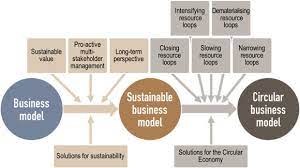As the global business landscape continues to evolve, sustainability is emerging as a central tenet for organizations looking to thrive in the future. Sustainable business models not only contribute to environmental and social well-being but also offer a strategic advantage in a world increasingly focused on responsible and ethical practices. In this article, we explore key elements of sustainable business models and how they shape the path for a more resilient and future-proof business environment.
Reducing Waste Through Circular Practices
Sustainable business models embrace the circular economy, where resources are used efficiently, and waste is minimized. Companies adopting circular practices focus on designing products with longevity, encouraging repairability, and recycling materials. This shift away from the traditional linear “take, make, dispose” model contributes to resource conservation and minimizes the environmental impact of production and consumption.
Extended Producer Responsibility (EPR)
In the circular economy, businesses take on extended producer responsibility. This means that companies are accountable for the entire lifecycle of their products, from production to disposal. Implementing EPR ensures that organizations actively participate in the collection, recycling, and proper disposal of their products, promoting sustainability throughout the value chain.
Transitioning to Clean Energy
Sustainable business models prioritize the integration of renewable energy sources to power operations. Transitioning to solar, wind, or other clean energy sources reduces carbon footprints and dependence on finite resources. Many companies are investing in on-site renewable energy solutions or purchasing renewable energy credits to support the development of sustainable energy infrastructure.
Energy Efficiency Measures
Apart from adopting renewable energy, sustainable businesses prioritize energy efficiency measures. This includes investing in energy-efficient technologies, optimizing operational processes, and implementing smart building designs. Energy efficiency not only reduces environmental impact but also results in cost savings over the long term.
Stakeholder Engagement
Sustainable business models recognize the importance of stakeholder engagement beyond profit margins. Engaging with stakeholders, including employees, customers, communities, and suppliers, fosters a sense of shared responsibility. Companies actively seek input from stakeholders, incorporate their perspectives, and contribute to the well-being of the broader community.
Diversity, Equity, and Inclusion (DEI) Practices
Incorporating diversity, equity, and inclusion practices is a fundamental aspect of social responsibility. Sustainable businesses prioritize creating inclusive work environments, promoting diversity in leadership, and ensuring fair and equal opportunities for all employees. DEI practices contribute not only to a positive workplace culture but also to the long-term success and resilience of the business.
Assessing Environmental Impact
Sustainable business models conduct thorough life-cycle assessments of their products. This involves evaluating the environmental impact of each stage, from raw material extraction to disposal. By understanding the environmental footprint of products, businesses can identify opportunities for improvement, make informed decisions, and prioritize eco-friendly alternatives.
Eco-Design Principles
Eco-design principles guide sustainable businesses in creating products with minimal environmental impact. This involves selecting sustainable materials, optimizing product packaging, and designing for disassembly or recycling. Eco-design not only aligns with environmental goals but also resonates with environmentally conscious consumers, contributing to brand reputation and customer loyalty.
Paperless Operations and Digital Platforms
Digital transformation is a key enabler of sustainability. Sustainable business models often prioritize paperless operations, reducing reliance on physical documents. Additionally, companies leverage digital platforms for communication, collaboration, and transactions, minimizing the need for extensive travel and physical resources.
Remote Work and Flexible Schedules
The shift to remote work and flexible schedules is another facet of digital transformation that aligns with sustainability. By reducing the need for daily commutes and office space, businesses contribute to lower carbon emissions. Remote work also supports employee well-being, enhancing work-life balance and job satisfaction.
Ethical Sourcing Practices
Sustainable business models extend their commitment to sustainability throughout the supply chain. Ethical sourcing practices involve selecting suppliers who adhere to environmental and social standards. Companies conduct due diligence to ensure that suppliers prioritize fair labor practices, ethical sourcing of materials, and environmentally responsible manufacturing.
Supply Chain Transparency
Transparency in the supply chain is a hallmark of sustainable business models. Companies disclose information about suppliers, manufacturing processes, and sourcing practices to stakeholders and the public. This transparency builds trust, allows consumers to make informed choices, and holds businesses accountable for ethical and sustainable practices.
Conclusion
Sustainable business models are not just a trend but a necessity for organizations aiming to thrive in the future. By embracing circular economy principles, integrating renewable energy sources, prioritizing social responsibility, conducting life-cycle assessments, and leveraging digital transformation, businesses can create a positive impact on the environment, society, and their long-term success. Sustainability is not only a responsibility but a strategic choice that ensures resilience and relevance in an ever-changing business landscape.

